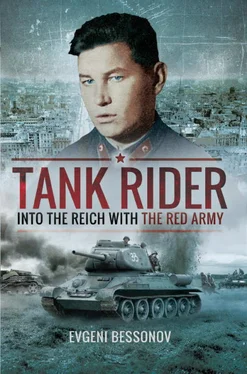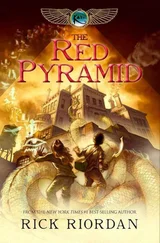Despite all difficulties, the battalion stubbornly pressed forward, mostly on foot. The 2nd and 3rd battalions of the Brigade were somewhere on their own missions, while the tank regiment had not caught up with us yet – it was delayed during unloading at Polonnoe railway station. Trucks and tanks arrived later and the speed of our advance increased. Our battalion liberated Podvolochinsk, and then Volochinsk, the 2nd battalion with the tank regiment captured Manachin and Golshintsy on 5 March, while the 3rd battalion occupied Voitovtsy. Heavy fighting took place for those settlements; the young soldiers did an excellent job in these battles. At first I doubted the abilities of some of the soldiers because of their shortness; I considered them not fit for war, but they turned out to be able to take hard physical pressures and go into battle right after a march. They turned out to be the right kind of soldier – fast, smart and brave, skilful in handling their weapons. I relied on them and they relied on me, as they knew that there would be no unnecessary losses among them. The main thing for a soldier is to trust his commander, be provided with all necesseties and know what he is fighting for. That is it!
Artillery, armour and trucks – mostly Studebaker trucks that had been stuck on the roads – gradually caught up with us, and for some time the battalion had an opportunity to advance on Studebaker trucks. These trucks replaced our Soviet-made ZIS-5 trucks, which had been the main truck of the country before the war and were already somewhat obsolete. We had a break from the unceasing marching on foot.
THE BATTLES FOR THE TOWN OF SKALAT

On 14 or 15 March, 1944, we approached the town of Skalat through rocky hills and started fighting for its liberation. The arrival of our battalion was quite unexpected for the German forces. They did not expect us to travel such a distance so quickly. However, the leadership of the Brigade for some reason did not use this element of surprise. As a result, all three battalions of the Brigade were stuck in street fighting. When our battalion arrived at the city in daytime, we – Shakulo, Kolosov and I (Gavrilov was wounded) – received an order from company commander Titov to advance along the left side of the road and go as deep as possible into the city. We did not encounter enemy resistance on the outskirts and advanced from house to house. The enemy was nowhere to be seen. We got a bit braver and realized that either there were no Germans in the city or they were retreating without a fight. Probably we were right. All of a sudden an orderly ran up to us with the order from the company commander to go back. We came back and reported that there were no Germans, but the company commander Titov told us that the sector where we were in was not our area of responsibility, it belonged to another unit and we were given the sector to the right side of the road. Other companies were also stopped. There was some confusion, we had not received the order to advance before darkness. We found a small house, abandoned by the occupiers, and the company occupied it. While the commanders were consulting, we laid down for a nap.
I was summoned to the battalion commander in the night. I entered the hut, where, in addition to battalion commander Kozienko, there were head of brigade staff Grigori Vasilievich Starovoit and some other staff officers. The mission that I was given was to advance forward on the road and locate the enemy – identifying in which buildings he had set up a defence, whether he had armour and what type of armour it was. I stated that I had already been in the city together with Shakulo’s platoon the day before and had not seen any enemy, not to mention tanks. Nevertheless, I was ordered to check the city one more time. I woke my platoon up, explained the mission to the soldiers, and briefed the squad leaders separately. We quietly started our advance to the town centre along the road. In front of the platoon, at some distance, I had a squad in the vanguard for security and reconnaissance – I did everything by the book. Quite soon, on their signal, we halted and lay down on the road. It turned out that we had run into soldiers from the Brigade’s scout company. They did not meet the enemy, did not see any tanks, but had heard voices from the building in front of us, and even said that they had seen a lit cigarette. When we reached the building at the crossroads of the two streets, I ordered a quiet search of the building. There was no enemy in the building; the scouts had made a mistake. It was war, it happened a lot. We did not advance any further, as the soldiers drew my attention to the sound of engines, and we recognized that tanks were advancing towards us, in fact, two Tiger tanks, which must have arrived shortly before to reinforce the infantry. Upon my return, I reported exactly what I saw – that the enemy had no infantry, even if he had, it was stationed in isolated strongpoints in some buildings (later this turned out to be true), as well as two tanks, which had not been in the city the day before. The commanders did not tell me anything and let me go to rest. I thought that I completed my mission. I do not know if they believed me after the report from the scout company. However, I can only say that if we had attacked the enemy in the city on the first day, we would not have suffered such unnecessary losses, being stuck in street fighting for almost a week from 14 to 20 March.
At dawn the battalions formed an attacking line in front of the city, in an open field, just as if it were a training session. The enemy was silent and did not open fire on us, although we were like sitting ducks for them. Why did we have to lie in the field? The battalion commander summoned us all for briefing. We, a group of officers, gathered in a group at the roadside, which did not even have ditches – not to mention any shelters, and all this was in the war! In the meantime, at least ten or twelve enemy aircraft appeared. They first dropped bombs on the tank regiment, which immediately suffered losses in tanks and personnel. After this the planes flew towards our battalion and opened fire on the soldiers, who had no time to dig in and were lying in the open. We were rescued by the fact that the planes had already dropped their bombs on the tank regiment.
Officers, before they could be briefed, dispersed in all directions, seeking cover. I also tried to find a shelter, but it was an open field, there was nowhere to hide. The battalion commander and several other officers dived into a drainpipe under the road surface. I couldn’t think of anything better than running back to my foxhole. A German pilot noticed me and opened fire on me. Bullets were kicking up spurts of mud all around me. The pilot dived five times, trying to kill me. He opened the cockpit and I saw the bastard laughing at me. Still, I made it safely to my foxhole, his bullets missed. I jumped into my foxhole, and the pilot ceased fire. Planes strafed the battalion several more times, firing at people, then gathered in a formation and left. Some guy in desperation opened fire from an anti-tank rifle, but quickly stopped firing, there was no point – it was not an anti-aircraft gun, after all.
The losses of the battalion were insignificant: several soldiers were wounded, as well as company commander Lieutenant Yu. A. Grigoriev and Sergeant-major Vasily Blokhin, formerly Sergeant Major in our company, of the 3rd company. After the air strike we were briefed and quickly advanced forward. The Germans opened fire only after we went into the city and captured several buildings. Our tanks tried to support us, but after the Germans knocked out three T-34 tanks, with their crews being burnt alive, the rest of our armour did not advance any further and hid behind the buildings. It was two Tigers that delivered most of the fire on our infantry and tanks; they had a very convenient firing position behind the buildings, where they could not be seen. Shakulo and I advanced forward with our platoons, hiding behind the buildings. We had to drive the Germans out of some buildings, while other buildings they abandoned without a fight. Advancing in this way, we captured the building in front of the square with a church, ending up in the centre of the town on the right side of the street. However, by the wall of that building there was a German tank. It fired for some time but ceased fire soon – apparently to conserve ammo. We did not have petrol bombs or anti-tank grenades to knock it out, we were running out of ammo ourselves. The battalion’s ammo depot had not arrived yet, and it would not arrive till the very end of Kamenets-Podolsk operation.
Читать дальше













